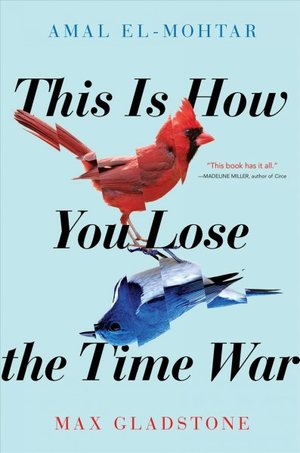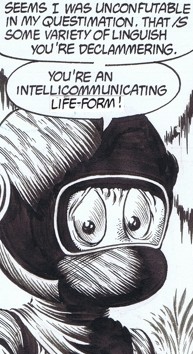
Possibly one of the most beautiful books I have read this year, this 200-page epistolary novel (novella?) co-written by Amal El-Mohtar and Max Gladstone. With chapters that tumble through timelines and settings, called Strands, in a seemingly-eternal war between two factions. One of them a “viney hivey elfworld” and the other a “techy mechy dystopia”, both laying down strategies that span multiple centuries and possibilities. All so that their side may win.
None of that is important.
What matters is the flow of words that mold the shape of the story, an exchange of letters between two agents on the opposing sides, named Red and Blue. These are not the only names the two use for each other, for the messages that begin as a trickle of taunts and challenges soon become missives laced with humor, flirtations, and emotions laid bare. With their words, they slash and thrust and parry, and very soon, they insinuate themselves in the other’s mind and heart. “Words can wound, but they can be bridges, too”, to quote a line.
The book made me lament the fact that over the years, everything we write seems to become terser, to the point. Like we have forgotten to surf through our ideas, to race through our waves of thought and action and slow them down into a dance of spaces and characters, punctuation and pause. We revel in our economy of discourse, images embedded with a sprinkle of words on the side, coated with a side of irony, all erasing the primal weaponry of words. We feel relief, both at saving ourselves the trouble of over-sharing, and of having saved the other person some time by compressing both our words and perhaps our feelings.
Even typing this feels wrong, like yelling into a void from where nothing echoes back. This feels like a predictable yearning for something which never really existed, the kind of weltschmertz that also seems to haunt one’s soul at a particular age. But mostly, it feels like a pity that no one I know ever says, “Tell me something true, or tell me nothing at all.” The small joy that reading a simile like “apophenic as a haruspex” brings.
Behold, the peerless use of language to both evoke emotions, and establish the character. This is Red, she of the technological antecedents.
I bite blueberry pancakes drizzled with maple syrup, extra butter — that expanding fluff, the berry’s pop against my teeth, butter’s bloom in my mouth. I explore sweetnesses and textures. I am never hungry, so I don’t race to the next bite. I eat glass, and as it cuts my gums, I savor minerals, metals, impurities; I see the beach from which some poor bastard skimmed the sand. Small rocks taste of the river, of rubbed fish scale, of glaciers long gone. They crunch, crisp, celery-like.
And this is part of a letter from Blue, she of the forest and the vale.
I love you. If you’ve come this far, that’s all I can say. I love you and I love you and I love you, on battlefields, in shadows, in fading ink, on cold ice splashed with the blood of seals. In the rings of trees. In the wreckage of a planet crumbling to space. In bubbling water. In bee stings and dragonfly wings, in stars. In the depths of lonely woods where I wandered in my outh, staring up — and even then you watched me. You slid back through my life, and I have known you since before I knew you.
I feel like I need to reread this book. Or better still, listen to it. Audio-books no longer put me to sleep, and Time War feels like the perfect candidate for a voice-over at the start of a work-day.
Highly, highly recommend.
